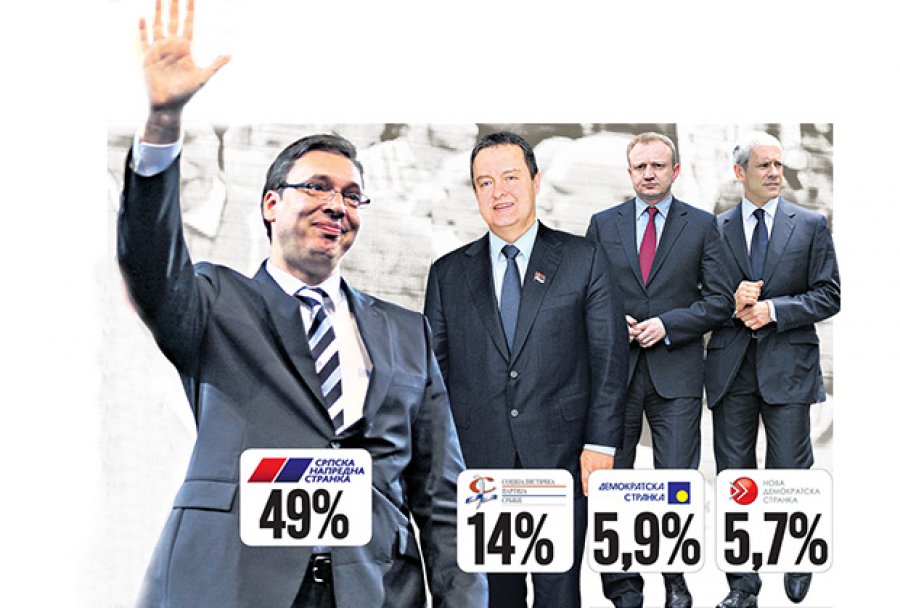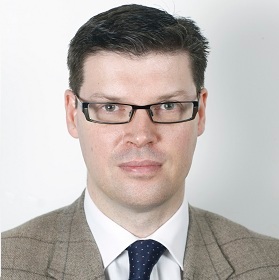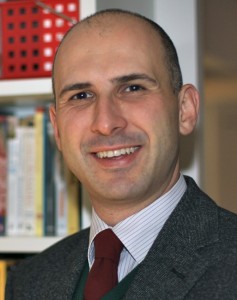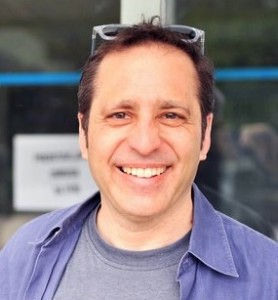The 16 March 2014 extraordinary parliamentary elections in Serbia were marked by a landslide victory by the Serbian Progressive Party (Srpska Napredna Stranka – SNS). While the success of the party and of its popular leader, the former Deputy PM Aleksandar Vučić (whose political background does not lack shadows), has not surprised anyone, the extent of it has been widely beyond expectations. The monopoly of SNS over the Serbian parliament now raises many questions about the country’s political future. Our experts discuss.

- Spyros Economides, London School of Economics
- James Ker-Lindsay, London School of Economics
- Branislav Radeljić, University of East London
- Eric Gordy, UCL School of Slavonic and East European Studies
- Milica Popović, PR Pepper
- Dušan Spasojević, Democratic Party, Serbia
Aleksandar Vučić has emerged as the complete Master of the Game
Dr Spyros Economides, Associate Professor in International Relations and European Politics, European Institute, London School of Economics
 Sunday’s election, as predicted, threw up one big winner, Aleksandar Vučić (and His Progressive Party –SNS). But if the winner wasn’t a surprise, the extent of the victory was rather more unexpected. With over 48 per cent of the vote and nearly 156 seats in Parliament, Vučić has not only won, he has emerged as the complete Master of the Game. The opposition is in disarray with a continuing squabble between the Democratic Party (DS) led by Dragan Đilas, and the New Democratic Party (NDS) of DS’s former leader Boris Tadić just squeaking into Parliament and diluting their potential power. Other parties, such as DSS of former PM Koštunica didn’t not even reach the threshold of 5 per cent which would have tipped them into parliament.
Sunday’s election, as predicted, threw up one big winner, Aleksandar Vučić (and His Progressive Party –SNS). But if the winner wasn’t a surprise, the extent of the victory was rather more unexpected. With over 48 per cent of the vote and nearly 156 seats in Parliament, Vučić has not only won, he has emerged as the complete Master of the Game. The opposition is in disarray with a continuing squabble between the Democratic Party (DS) led by Dragan Đilas, and the New Democratic Party (NDS) of DS’s former leader Boris Tadić just squeaking into Parliament and diluting their potential power. Other parties, such as DSS of former PM Koštunica didn’t not even reach the threshold of 5 per cent which would have tipped them into parliament.
Vučić now holds all the cards and can decide whether and with whom he will form a coalition. It is expected, that the Socialist Party of Ivica Dačić will be invited to resume it current coalition with SNS, but under Vučić’s terms. But it is also widely rumoured that Vučić will wish to try and entice others in to his coalition to disarm all opposition in parliament. A likely candidate is Boris Tadić who, according to many in Belgrade, could be tempted into accepting a top foreign policy role, if not the foreign ministry itself. Likewise the Belgrade press was making much of a Vučić throw-away line that Đilas and his DS too could be a coalition partner. Essentially, Vučić does not need a coalition so there is no negotiation to be had: he can offer ‘take it or leave’ deals to all and sundry. If they accept he controls them from within; if they decline they are cast adrift and rendered ineffective by his parliamentary majority.
But it remains to be seen which Vučić will rule as PM. Will it be a confident, secure PM who no longer seeks public acclamation and can carry out the promised domestic reforms and continue the fight on corruption, as well as pursue Serbia’s EU perspective? Or will it be an uncontrollable Vučić, of the overwhelming majority who will continue to undermine opponents and freedoms alike through control of the press and use of the judicial and police forces for party uses? This is the big question facing the Serbian people in the next few days.
A number of parties were not returned to Parliament – will they disappear, or will they reform?
Dr James Ker-Lindsay, Senior Research Fellow, LSEE Research on South Eastern Europe, London School of Economics @JamesKerLindsay
 In the immediate future, this result may force the Progressives to rethink their earlier ideas about forming a coalition government. With such a clear command of the Serbian Parliament, will they really want to go through the difficulties of working with a partner? My guess is that they will still want to look into this option. There will be a number of difficult, but important, decisions to be made in the coming years, for example over the economy and EU accession, that might be better done with at least some support from a coalition partner. Also there is the possibility that they might want to pursue constitutional change. They do not have the number of votes to do this at this stage. A partner would allow them to do so.
In the immediate future, this result may force the Progressives to rethink their earlier ideas about forming a coalition government. With such a clear command of the Serbian Parliament, will they really want to go through the difficulties of working with a partner? My guess is that they will still want to look into this option. There will be a number of difficult, but important, decisions to be made in the coming years, for example over the economy and EU accession, that might be better done with at least some support from a coalition partner. Also there is the possibility that they might want to pursue constitutional change. They do not have the number of votes to do this at this stage. A partner would allow them to do so.
Related to this, another key question that is being asked is what this means for Aleksandar Vučić, the leader of the Progressives, who will be the new prime minister. As deputy prime minister in the previous government, few really doubted that he has been the real power behind the throne for the past couple of years. However, he could still hide behind the then prime minister, Ivica Dačić, on difficult questions, such as the normalisation of relations with Kosovo. This will no longer be the case. He will now be the sole decision-maker. Will he still be willing to take politically adventurous or risky decisions, even with support from a (very junior) coalition partner? Also, will this accumulation of power see him become increasingly authoritarian, as a number of observers have suggested.
Finally, it will be very interesting to see what happens to Serbian politics more generally. A number of parties were not returned to Parliament, including the Democratic Party of Serbia (DSS), which had strongly opposed Serbia’s EU accession and took a very hard line on Kosovo, and the Liberal Democratic Party (LDP), which had the most moderate position on Kosovo and was the most liberal voice in Serbian politics. Will they now disappear, or will they reform (or even merge with others) and come back in the future? And how will relations develop between the Democratic Party (DS) and the New Democratic Party (NDS), a splinter party recently formed by Boris Tadić, the founder and former leader of DS? Both will be in the new parliament, but is there space for them both in the longer term?
The Serbian Progressive Party has so far been practising a politics of opportunities; we are not yet in a position to ignore their far-right background
Dr Branislav Radeljić, Senior Lecturer in International Politics, University of East London
 Regardless of the low turnout, which was anyway expected, and the electorate’s profile, the clear victory of the Progressivists confirms the existence of a strong belief in their rhetoric and some semi-fulfilled actions. Since its establishment in 2008, the Serbian Progressive Party has focused more on the politics of opportunities and less on, what still characterises many opponents, the politics of alternatives. With such an approach, the party’s representatives have managed to convince the necessary portion of the electorate that they will be the ones to fight corruption, create new jobs, secure political stability and international reputation of Serbia, and more. Here, the main question is whether this will really be the case, given that we are not yet in a position to ignore the Progressivists’ far-right background, questionable expertise dominating a number of party’s highly-positioned officials and therefore their incapacity to pursue necessary reforms. The impoverished Serbian society is tired of empty promises and it rightly expects a lot from the current elite. A failure to meet people’s expectations within a certain period of time could have dramatic consequences. As someone who has followed and written about Serbian politics, I would advise the new establishment to form a team of experts, regardless of their party affiliation and hopefully without any political affiliation, foster an open debate and learn to handle criticism, for the sake of the overall progress of Serbia.
Regardless of the low turnout, which was anyway expected, and the electorate’s profile, the clear victory of the Progressivists confirms the existence of a strong belief in their rhetoric and some semi-fulfilled actions. Since its establishment in 2008, the Serbian Progressive Party has focused more on the politics of opportunities and less on, what still characterises many opponents, the politics of alternatives. With such an approach, the party’s representatives have managed to convince the necessary portion of the electorate that they will be the ones to fight corruption, create new jobs, secure political stability and international reputation of Serbia, and more. Here, the main question is whether this will really be the case, given that we are not yet in a position to ignore the Progressivists’ far-right background, questionable expertise dominating a number of party’s highly-positioned officials and therefore their incapacity to pursue necessary reforms. The impoverished Serbian society is tired of empty promises and it rightly expects a lot from the current elite. A failure to meet people’s expectations within a certain period of time could have dramatic consequences. As someone who has followed and written about Serbian politics, I would advise the new establishment to form a team of experts, regardless of their party affiliation and hopefully without any political affiliation, foster an open debate and learn to handle criticism, for the sake of the overall progress of Serbia.
Politicians around the world seem more than willing to forgive or overlook Mr Vučić’s unsavoury past
Dr Eric Gordy, Senior Lecturer, UCL School of Slavonic and East European Studies @EricGordy
 Vučić and the SNS seem to have got a level of support that is entirely unprecedented in the post-Communist period in Serbia. The percentage of votes received by SNS is greater than what was received by Miloševič’s SPS at the height of its popularity in 1990. More than this, this support has been received in a favourable international environment, where politicians around the world seem more than willing to forgive or overlook Mr Vučić’s unsavoury past. The fact that rule by a single party has become possible carries with it several dangers, made deeper by the fact that political power has not been separated from other types of power in the period since 2000. SNS will try to extend its control over the legislative and executive branches of government to all fields of political, economic, social and cultural life. It will do so in a period in which it seems that the formal political opposition has no real capacity to act at all. Every post-2000 government has attempted to create this situation, but the present one is the only one to have succeeded. Probably the deepest danger is that without diversity in formal institutions, political opposition will move outside of institutions, which means that absolute majority rule will undermine rather than enhance stability.
Vučić and the SNS seem to have got a level of support that is entirely unprecedented in the post-Communist period in Serbia. The percentage of votes received by SNS is greater than what was received by Miloševič’s SPS at the height of its popularity in 1990. More than this, this support has been received in a favourable international environment, where politicians around the world seem more than willing to forgive or overlook Mr Vučić’s unsavoury past. The fact that rule by a single party has become possible carries with it several dangers, made deeper by the fact that political power has not been separated from other types of power in the period since 2000. SNS will try to extend its control over the legislative and executive branches of government to all fields of political, economic, social and cultural life. It will do so in a period in which it seems that the formal political opposition has no real capacity to act at all. Every post-2000 government has attempted to create this situation, but the present one is the only one to have succeeded. Probably the deepest danger is that without diversity in formal institutions, political opposition will move outside of institutions, which means that absolute majority rule will undermine rather than enhance stability.
…and two views from Serbia:
Media coverage of the campaign shaped the results significantly: tabloids were attacking opposition leaders on a daily basis
Milica Popović, Political Analyst, PR Pepper @MimaPpvc
 After Sunday’s election, it is now clear that the Serbian parliament will be composed solely of pro-EU parties. With Serbian Progressive Party (SNS) winning almost two-thirds majority (158 seats out of 250), we can expect constitutional changes and the closing of the Kosovo issue, and also local and regional (in Vojvodina) elections in the near future. It is alarming that in spite of the great amount of resources spent in the campaign, the voter turnout was only 53,12%. What is more, 22% of the votes went to the parties that did not pass the electoral threshold.
After Sunday’s election, it is now clear that the Serbian parliament will be composed solely of pro-EU parties. With Serbian Progressive Party (SNS) winning almost two-thirds majority (158 seats out of 250), we can expect constitutional changes and the closing of the Kosovo issue, and also local and regional (in Vojvodina) elections in the near future. It is alarming that in spite of the great amount of resources spent in the campaign, the voter turnout was only 53,12%. What is more, 22% of the votes went to the parties that did not pass the electoral threshold.
Media coverage of the campaign shaped the results significantly, especially the tabloids which were attacking opposition leaders on daily basis. We should not overlook the fact that Aleksandar Vučić, de facto the most powerful man in Serbian politics and the leader of Serbian Progressive Party, did not participate in public debates with other candidates.
After 24 years of weak governments, a clear majority is good news – but there will be virtually no real opposition
Dušan Spasojević, Foreign Affairs Committee Chairman of the Democratic Party, Serbia @DS_Spasojevic
 Sunday’s election in Serbia has, in spite of a relatively low turn-out (53%), after 24 years of weak and unstable coalition governments, returned a clear majority in parliament which will enable one party to form the future government. This undoubtedly is good for the country because the next government will have the strongest possible mandate to fulfil its pre-election pledges. However, the worrying part is that there will be virtually no real opposition in the next Serbian parliament to ensure a healthy internal debate on issues concerning the future of Serbia and the region as a whole. Also of concern is the fact that 25 percent of actual votes did not translate into parliamentary mandates, given that 15 out of the 19 parties in the election did not reach the 5 percent threshold.
Sunday’s election in Serbia has, in spite of a relatively low turn-out (53%), after 24 years of weak and unstable coalition governments, returned a clear majority in parliament which will enable one party to form the future government. This undoubtedly is good for the country because the next government will have the strongest possible mandate to fulfil its pre-election pledges. However, the worrying part is that there will be virtually no real opposition in the next Serbian parliament to ensure a healthy internal debate on issues concerning the future of Serbia and the region as a whole. Also of concern is the fact that 25 percent of actual votes did not translate into parliamentary mandates, given that 15 out of the 19 parties in the election did not reach the 5 percent threshold.



